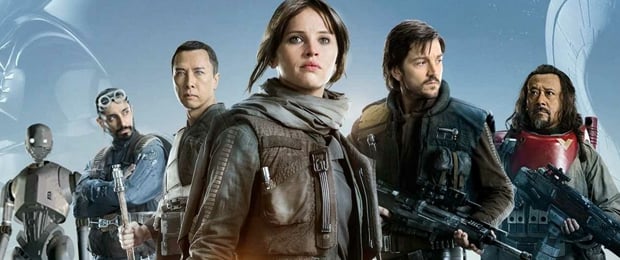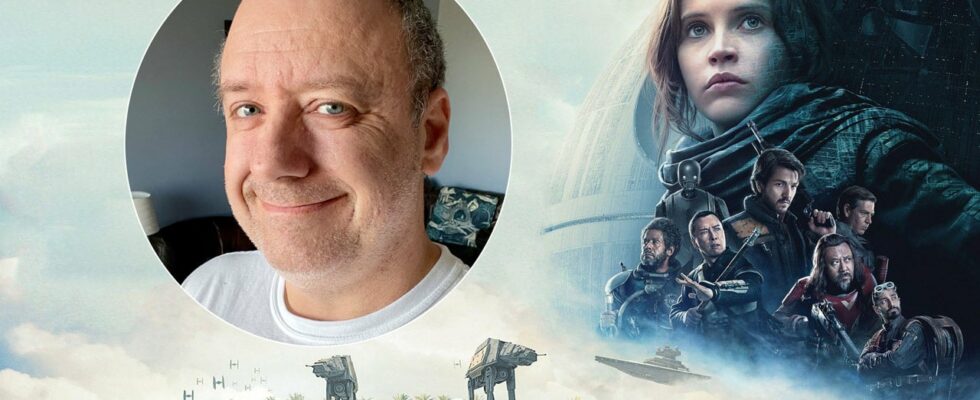Former video games journalist, author of comics, novels, editor, screenwriter for cinema including the formidable “Star Wars Rogue One”, Gary Whitta is a true jack of all trades. Exclusive interview with a talent who already seems to have had a thousand lives.
Former journalist and video game reviewer; Designer at Microsoft, Electronic Arts, Activision, Midway Games; responsible for narrative development of the video game adaptation of the television series The Walking Dead; author of comics and novels; editor; screenwriter of the post-apo sci-fi film The Book of Eli, After Earth and especially the fantastic spin-off of the Star Wars saga, Rogue One, which will bring in $1.05 billion for Disney/Lucasfilm… Gary Whitta, 51 years old, is a real jack of all trades. And already seems to have had a thousand lives.
We had the opportunity to speak with him to retrace his astonishing journey, discuss his passion for video games, or the real capacity of certain video game franchises to surpass or even debunk the supremacy of Marvel or Star Wars licenses, at present where we have been talking, for a while now, about tired superheroes and overproduction around the universe created by George Lucas.
Many movie fans know you from your work as a screenwriter on “The Book of Eli,” “After Earth” and “Rogue One: A Star Wars Story.” Very few people actually know that you started your career as a video games journalist. Can you talk about it, talk about your personal connection with it?
Gary Whitta : When I was a child, my main passions were cinema and video games, and I always dreamed of pursuing one of these interests professionally. At first I liked the idea of making games, but I quickly realized that I didn’t have the technical aptitude for it.
So I decided to write about games because writing was something I was good at. So I got my first job reviewing Commodore 64 and Amiga games for a magazine, then I became editor-in-chief of PC Gamer. Although I haven’t worked full-time in the video game industry in over 20 years, I am still an enthusiast of video games, with a particular interest in storytelling in games.
Gary Whitta Gary Whitta
How and when did you evolve from being a journalist to working directly for companies like Microsoft, working on games like Gears of War? Was it an obvious or natural transition for you?
When I decided to move from games journalism to screenwriting, writing for games seemed like a natural path indeed, and the timing was right because it was around the time when game developers Video games were finally starting to take storytelling seriously, and were looking for outside writers to collaborate with.
As for Microsoft, which bought the publisher Bethesda, have you played Starfield?
I really enjoyed playing Starfield, and I think it’s a good example of how storytelling in games can attempt to be more ambitious than in more linear media like film and television. , because you can tell a story across a very broad canvas that can be experienced over time, over the course of hundreds of hours in fact, and no two story experiences are the same.

Bethesda
image from the game “Starfield”.
Screenwriters like you, who can easily move between industries, from film to video games, aren’t that common. There aren’t many examples. Alex Garland is one of them, or for example Halley Wegryn Gross, who has a strong background in television writing and collaborated with Neil Druckmann on the story of The Last of Us Part II. What is your opinion on this?
I think it’s a very natural overlap, especially since the new generation of screenwriters and filmmakers are much more comfortable and receptive to video games, because they’re much more a part of mainstream culture today than in the past. And video games are now much more focused on story and creating a cinematic experience than in the past, so creative skills are becoming more and more common between the two.
Speaking of scriptwriting, you worked on Rogue One, considered one of the most fantastic spin-offs in the Star Wars saga, if not the best. What, if any, lessons learned from your previous jobs in the video game industry have proven beneficial to this project? Can you tell us how you got the opportunity to work for Lucasfilm?
I don’t think my video game experience helped prepare me to work on Star Wars, but my life as a Star Wars fan certainly did. I think my ability to speak passionately and from the heart about my love for this universe helped me land the job, but to some extent I was lucky because my pitch for Rogue One landed turned out to fit what some of the key creative people at Lucasfilm already had in mind for the direction of the project.

Lucasfilm Ltd.
Star Wars and Marvel are huge franchises that seem unstoppable; deeply rooted in Pop culture. On the other hand, video games are full of incredible universes, with very deep narration, strong stories and sometimes breathtaking visual approaches. Do you think video games have become the main vehicle for bringing original science fiction stories to a wide audience, surpassing films, television or existing franchises?
As Hollywood becomes more committed than ever to exploiting existing sci-fi franchises, sometimes to the point of creative exhaustion and audience fatigue, I think video games are increasingly the destination for those who are looking for more original science fiction stories, with innovative ideas, involving greater degrees of creative risk and experimentation.
Games like Citizen Sleeper, Disco Elysium And Ebbing are all excellent examples of world-building and bold, original science fiction storytelling that would be extremely difficult to achieve in the Hollywood system due to the aversion to risk and lack of willingness to try new things.
About ten years ago, I met Neil Blomkampwho told me this: “More and more young people are immersing themselves in video games. Cinema will evolve like books. Before, almost all children read books. And this gradually transformed into ‘all children watch television and films’ . There are still children who read books, but perhaps not as many. Cinema could disappear to the same extent, replaced by video games. The question is: how will the visual and narrative style of films be found is he in games?” What do you think ?
To some extent, many of the visual storytelling techniques and language of cinema are already extremely visible in video games, and I think this will only increase as game creators develop a better understanding of the techniques that can be successfully transported from one media to another.
The trick is to develop this understanding of what works and what doesn’t, and why. Audiences don’t want “interactive movies” – we tried that in the 90s, and it didn’t work – they want video games with rich, immersive stories.
Last question: what are you playing at the moment? What is your favorite video game?
My most played games in 2023 were Diabo IV, Spider-Man 2, Party Animals, Vampire Survivors, and Balder’s Gate III. I don’t have a favorite game of all time, because it’s way too hard to choose just one!
